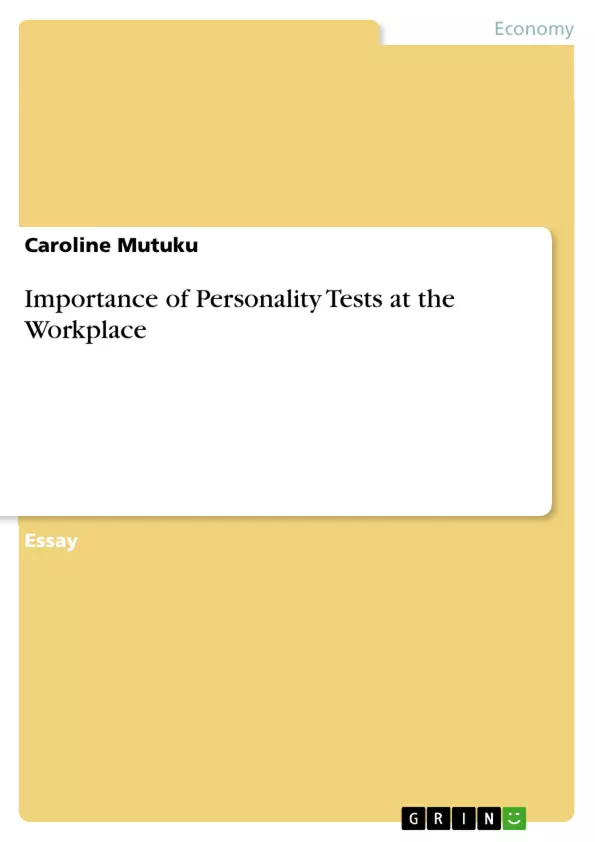Personality tests or assessments have been noted to be a strong predictor of job performance, and in some cases, they play significant roles in job interviews. Furthermore, they can exhibit limited potential for adverse effects compared to cognitive ability tests. As a result, it is noteworthy noticing that the use of personality tests by organizations for personnel selection has become increasingly popular among different organizations.
Indeed, a significant percentage of surveyed organizations, according to recent research, have been confirmed to be either using or considering the use personality tests for executive selection as well as development. Suitable validated personality tests remain to be attractive tools of selection since they aid in providing a data-based and non-subjective method that is used in the identification of high-potential workers who are capable of adapting a certain work environment.
However, although the term personality test is used generically, some of the personality tests are not suitable for personnel selection; the suitable personality tests for selection purposes are the ones measuring traits while measures of psychological type should not be used. Thus, this essay aims at critically analyzing the importance of personality tests in the workplace.
Table of Contents
- Abstract
- Importance of Personality Tests at the Workplace
Objectives and Key Themes
This essay critically analyzes the importance of personality tests in the workplace. It examines the increasing use of personality tests in personnel selection and explores their effectiveness and fairness. The essay also investigates the relationship between personality traits, job performance, and the limitations of personality tests.
- The growing use of personality tests in organizational settings.
- The relationship between personality traits and job performance.
- The validity and reliability of personality tests in personnel selection.
- Comparison of personality tests with other selection tools (e.g., cognitive ability tests).
- The limitations and potential biases associated with personality tests.
Chapter Summaries
Importance of Personality Tests at the Workplace: This chapter delves into the widespread adoption of personality tests in modern organizations for assessing employee characteristics. It highlights the use of personality tests in employee selection, aiming to identify individuals possessing not only the necessary skills and knowledge but also personalities compatible with specific roles. The chapter underscores the role of psychology in measuring personality and emotional intelligence (EQ) to enhance the hiring process, increasing the likelihood of successful employee integration. While acknowledging the strong correlation between cognitive abilities and job performance, it emphasizes the significant contribution of personality as a key factor. The discussion also touches upon the increased scrutiny of personality tests' fairness and effectiveness, prompting some organizations to modify or discontinue their use. The chapter sets the stage for a deeper investigation into the validity and reliability of personality tests, a crucial aspect explored in subsequent sections.
Keywords
Personality tests, personnel selection, job performance, validity, reliability, emotional intelligence (EQ), Five Factor Model, cognitive ability tests, adverse impact, frame-of-reference effect.
FAQ: A Comprehensive Language Preview
What is the purpose of this document?
This document provides a comprehensive preview of a language text, including its table of contents, objectives and key themes, chapter summaries, and keywords. It serves as an overview to understand the text's scope and content.
What topics are covered in this text?
The main topic is the importance and implications of personality tests in the workplace. The text critically analyzes their use in personnel selection, examining their effectiveness, fairness, and limitations. It explores the relationship between personality traits, job performance, and compares personality tests with other selection methods.
What are the key themes explored in the text?
Key themes include the growing use of personality tests in organizations, the correlation between personality traits and job performance, the validity and reliability of these tests, a comparison with other selection tools (like cognitive ability tests), and potential biases and limitations associated with personality tests.
What is discussed in the chapter on "Importance of Personality Tests at the Workplace"?
This chapter details the widespread use of personality tests in organizations for assessing employee characteristics. It highlights their role in employee selection, focusing on identifying individuals with suitable personalities for specific roles, in addition to skills and knowledge. The chapter emphasizes the role of psychology in measuring personality and emotional intelligence (EQ) and acknowledges the scrutiny surrounding their fairness and effectiveness.
What keywords are associated with this text?
Keywords include: Personality tests, personnel selection, job performance, validity, reliability, emotional intelligence (EQ), Five Factor Model, cognitive ability tests, adverse impact, frame-of-reference effect.
What is the structure of the text?
The text is structured with an abstract (not shown in this preview), a table of contents, a section outlining objectives and key themes, chapter summaries, and a list of keywords. It's designed to provide a clear and concise overview of the main content.
What are the limitations of personality tests, as discussed in the preview?
The preview hints at the limitations and potential biases associated with personality tests, suggesting that these are discussed in more detail within the full text. This implies a critical examination of their application in personnel selection.
What is the relationship between personality traits and job performance according to the preview?
The preview indicates that the text explores the relationship between personality traits and job performance, suggesting that a correlation exists, but the strength and nature of this correlation are likely discussed in detail within the complete text.
- Quote paper
- Caroline Mutuku (Author), 2018, Importance of Personality Tests at the Workplace, Munich, GRIN Verlag, https://www.grin.com/document/429860




